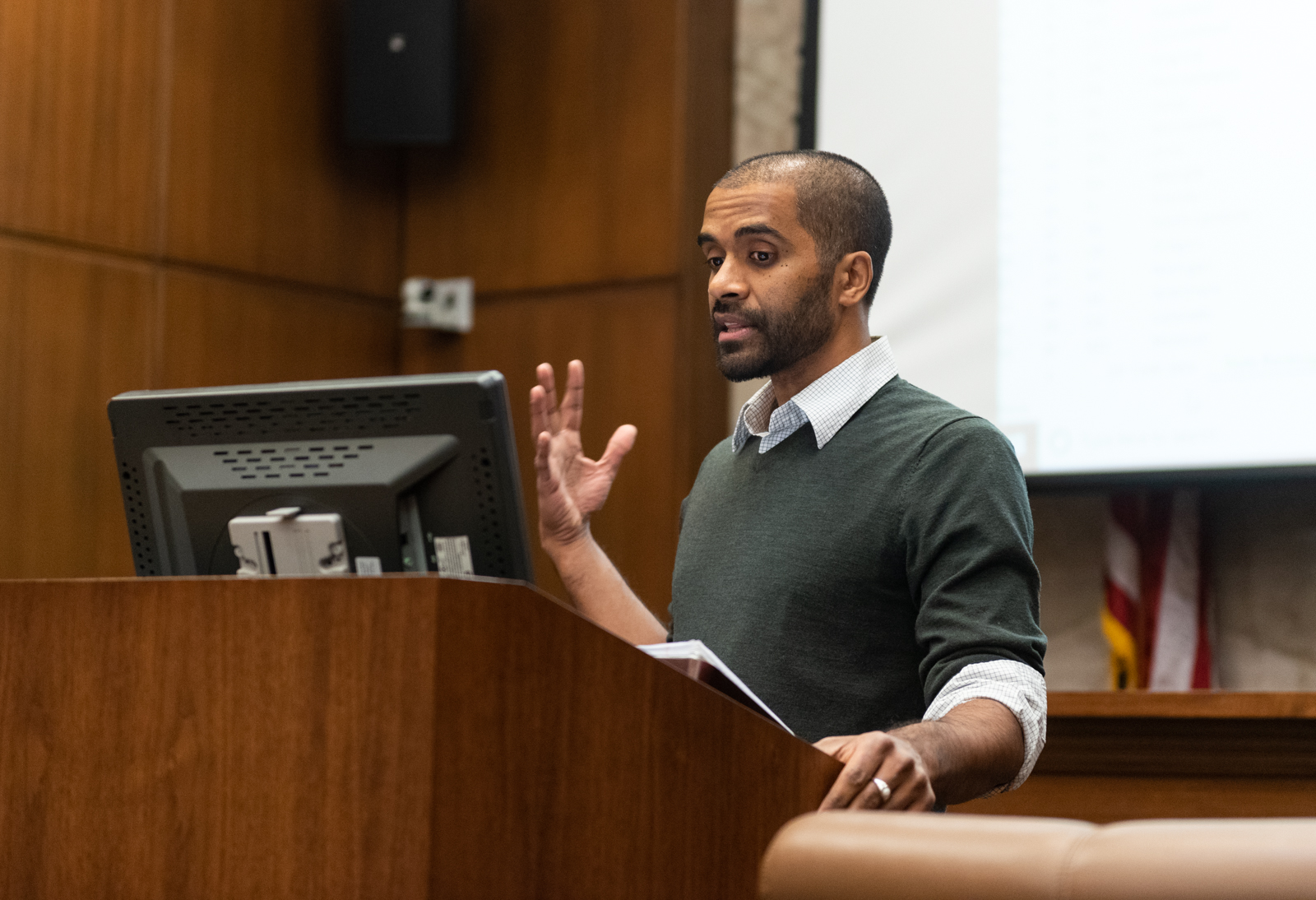Visiting professor discusses recent federal tax law and mitigation techniques

University of California Hastings College of the Law professor Manoj Viswanathan said there are a number of ways to bypass a recent cap on tax deductions. The Tax Cuts and Jobs Act, which went into effect January 2018, capped these deductions. (Tanmay Shankar/Daily Bruin)
By Dawit Tefera
Feb. 28, 2019 12:53 a.m.
A law professor proposed ways for individuals and local and state governments to mitigate the impacts of a recent cap on tax deductions at an event Wednesday.
Law professors Kirk Stark and Jason Oh spoke at a UCLA School of Law event with Manoj Viswanathan, an associate law professor at the University of California Hastings College of the Law, about a law passed by Congress in 2017.
“Professor Viswanathan and I worked together, along with the half-dozen other legal scholars from around the country, to consider ways in which states might be able to mitigate the adverse effects of the new (state and local tax) cap,” Stark said.
State and local tax, or SALT, deductions allow taxpayers to deduct their sales taxes, state income taxes and property taxes from federal taxes, reducing the amount they owe in federal taxes.
Before the change in federal law, taxpayers could take unlimited SALT deductions, meaning they could deduct the entire amount they owe to state governments in federal taxes. The Tax Cuts and Jobs Act, which went into effect January 2018, capped the deductions at $10,000, requiring taxpayers to pay the remainder of federal taxes not covered by the deduction.
Viswanathan said 90 percent of SALT deductions are utilized by people who make more than $100,000 a year.
“The states that made a lot of noise about the cap on SALT deductions are high tax states like California, New York, New Jersey because they have high tax rates for upper-income people who utilize these deductions,” he said.
Viswanathan added he thinks the changes were made to prevent residents of Democratic states that have higher state and local taxes from deducting their state taxes from their federal taxes.
Wealthier individuals are affected more by the SALT cap because the deduction lowers federal taxes by a larger amount when state and local tax rates are higher, Viswanathan said. He added that states have tried to let their taxpayers bypass the cap on SALT deductions through methods such as giving money to charity, as charitable deductions are exempt from the cap.
“The changes in federal tax laws didn’t really limit in a real way the deductibility of charitable deductions, so the taxpayer ends with fully deductible transfers to state and local governments,” he said.
These methods of bypassing the cap on SALT deductions adhere to tax regulations, he added.
Viswanathan said his proposals are tailored to the needs of individual cities.
He said there are a number of other ways to respond to the SALT deduction cap. He added that, for example, individuals could form corporations to avoid the cap, as corporations are exempt from the limit.
Viswanathan said a number of states on the East and West coasts, including California, have tried to remove the cap through legal action or legislation at the state level.
Daniel Kellerman, a law student, said he is not entirely sympathetic to higher earners who have been affected by the cap on SALT deductions.
“If the (income) rates would be raised for everybody, then the inability to deduct would be painful for more people and it would change the political climate (surrounding the removal of) the caps on the SALT deductions,” he said.
Andrew Kim, a law student, said he finds the cap on SALT deductions to be very controversial because he thinks coastal states don’t like how it negatively affects their residents.
He added it was interesting to hear Viswanathan’s proposals, but added he does not feel sympathetic to wealthy people affected by the cap.
“Your tax liabilities determine how you feel about the changes to SALT and for some people it would be super beneficial and for others it doesn’t apply,” he said.
Kim said he doesn’t like that the cap has the greatest impact on those who live in coastal cities and heavily Democratic states.
“I think (the future of the cap) will have to do a lot with the upcoming federal elections about how states that are affected by the caps will make some changes hopefully,” he said.

